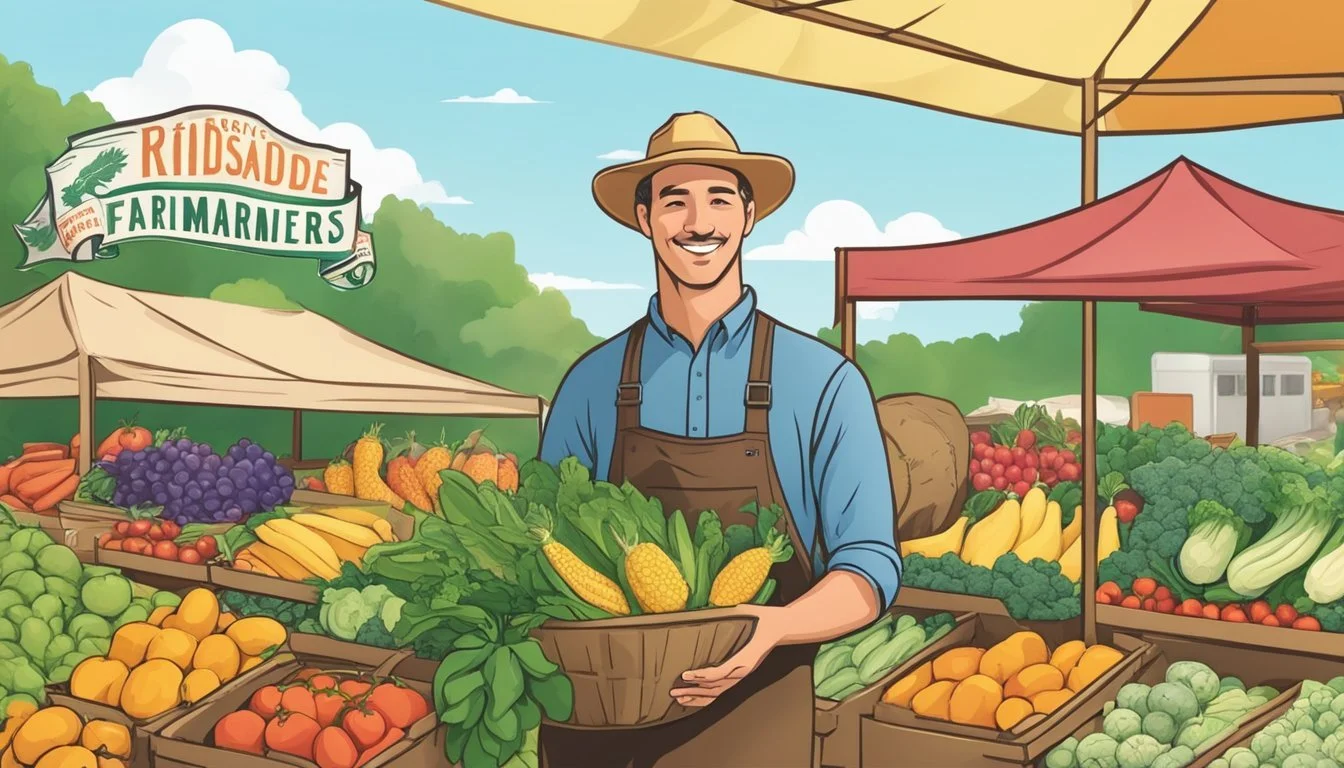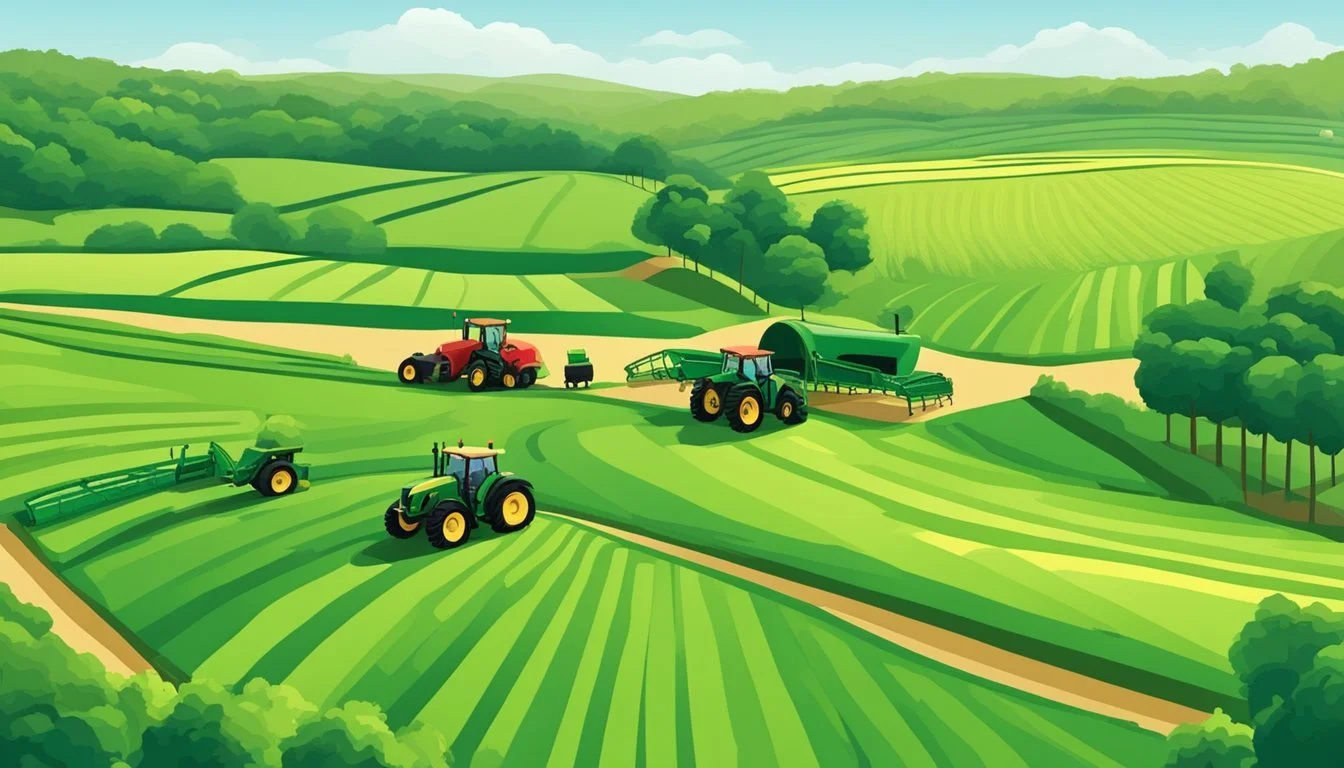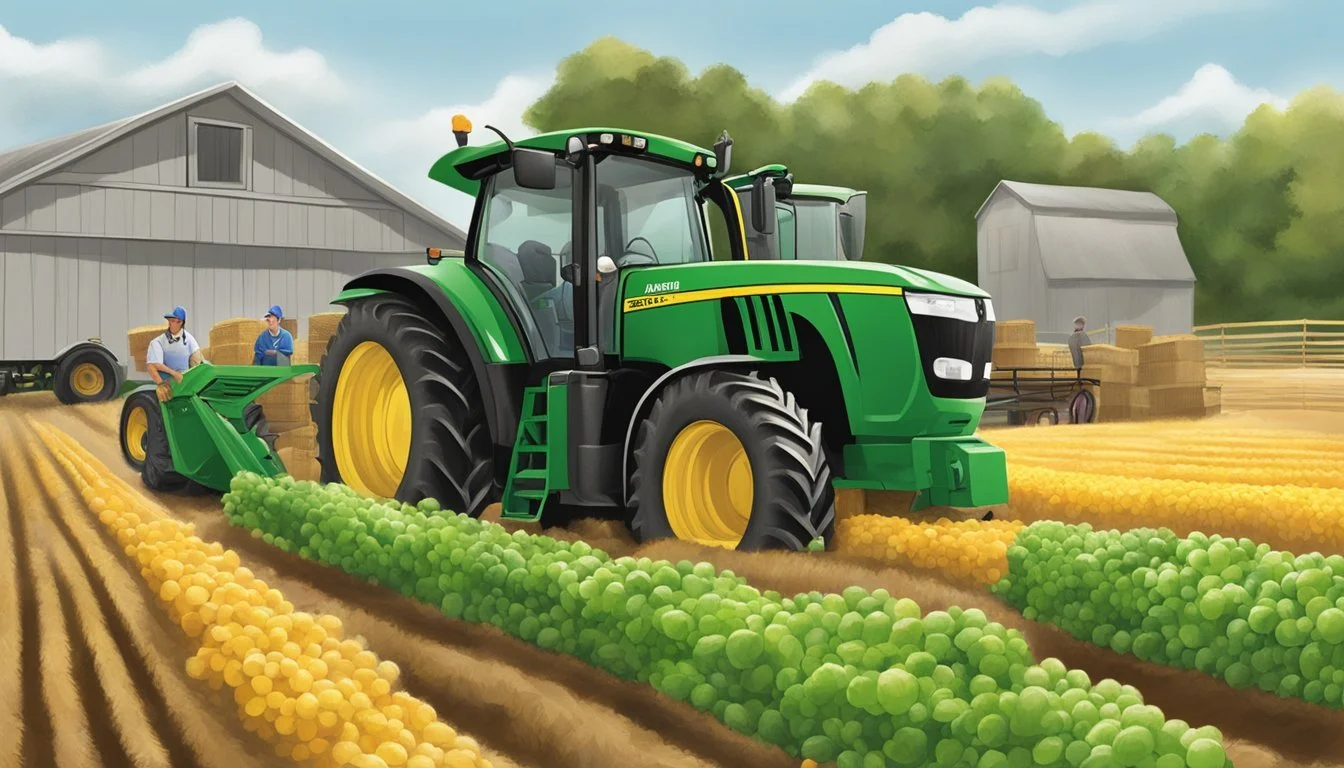Farming Grants Rhode Island
Opportunities for Agricultural Growth
Rhode Island, as a state with a vibrant agricultural sector, offers a range of farming grants that aim to support farmers and enhance sustainability in food production. These grants provide financial aid for innovation, energy efficiency, infrastructural improvements, and compliance with regulatory standards. They serve as a crucial resource for individual farmers, ranchers, and agricultural businesses looking to advance their operations, implement conservation strategies, or expand their market reach.
The state's focus on innovative agricultural practices is exemplified through initiatives such as the Conservation Innovation Grants (CIG). These grants are designed to encourage the adoption of novel conservation techniques in conjunction with agricultural production. Similarly, programs like the Local Agriculture and Seafood Act (LASA) grants prioritize the development of local food systems, acknowledging the role of smaller-scale food producers in Rhode Island's agricultural landscape.
Further support is evident in the form of various grant opportunities targeting specific areas of agriculture, such as organic farming, specialty crops, and food safety improvements. By investing in these areas, Rhode Island aims to fortify its agricultural sector against challenges and ensure a resilient food system. The state extends this support through a range of agencies, ensuring that farmers have access to financial assistance tailored to diverse agricultural needs.
Understanding Farming Grants in Rhode Island
Rhode Island's Department of Environmental Management offers various grant opportunities for the agricultural sector. These grants aim to support farmers, enhance sustainable practices, and promote local food systems.
Overview of Grant Opportunities
The Rhode Island Department of Environmental Management, through its Division of Agriculture, offers several grant programs to support the development of agriculture in the state. Notable among these is the Local Agriculture and Seafood Act (LASA) Grants Program, which is designed to bolster the state's local food system. The Farm Energy program provides grants focusing on energy efficiency and renewable energy projects for farms. Additionally, the state participates in the Conservation Innovation Grants (CIG) program, funded by the National Resources Conservation Service, promoting innovative conservation approaches in conjunction with agricultural production.
Eligibility Criteria for Applicants
To qualify for agricultural grants in Rhode Island, applicants must typically be involved in the agricultural sector, whether as farmers, educational institutions, non-profit organizations, or businesses directly related to farming. Specific grants might have more detailed criteria, such as project type, size of operation, and demonstrable need for funding. The Division of Agriculture provides resources for potential applicants to understand the specific eligibility requirements for each grant opportunity.
Application Process and Timeline
Applicants interested in agriculture grants must adhere to a defined application process, which generally starts with a call for proposals. Following this, applicants submit their proposals by a specified deadline, after which the Division of Agriculture reviews these submissions. The LASA grants, for instance, are awarded annually with a typical application window opening at the start of the year. Prospective applicants are urged to contact the Division of Agriculture for assistance and to ensure accurate information regarding submission deadlines and required documents.
Types of Grants Available
Rhode Island offers a variety of grants to support the diverse needs of its agricultural sector, focusing on local food initiatives, innovation, conservation, and sustainable practices. These grants provide financial support for agricultural land development, beginning farmers, aquaculture, and the promotion of specialty crops, among other areas.
Local Agriculture and Seafood Act (LASA) Grants
The LASA Grant Program provides funds up to $20,000 to commercial farmers, fishermen, producer groups, and non-profit organizations. The goal is to enhance the sustainability of local food systems and support the growth of small-scale agriculture and aquaculture in the state.
USDA Agricultural Grants
The United States Department of Agriculture (USDA) offers agricultural grants through various initiatives. This includes the Farm Service Agency (FSA) which provides assistance to farmers for land conservation efforts and the Natural Resources Conservation Service (NRCS) focusing on partnerships and technical assistance for conservation innovation.
Innovation and Research Grants
Grants under this category are directed at fostering new agricultural techniques and practices. They stimulate the development and adoption of innovative conservation approaches and technologies in conjunction with agricultural production.
Conservation and Sustainability Grants
These grants include funding from the NRCS for projects that align with federal conservation programs. With a focus on climate change mitigation, they aim to implement sustainable practices that preserve the environment while also enhancing agricultural productivity.
Support for Beginning Farmers and Ranchers
In Rhode Island, beginning farmers and ranchers have access to an array of support mechanisms designed to foster their development in the agricultural sector. This support is essential to ensure a generation of new agricultural professionals thrive, securing food systems and the sustainability of rural economies.
Educational Programs and Resources
To build a solid foundation, educational programs are a cornerstone of assistance for those starting in agriculture. The Beginning Farmer and Rancher Development Program (BFRDP) provides grants to organizations that, in turn, offer education, mentoring, and technical assistance. These resources are pivotal to equipping new entrants with the knowledge and skills necessary to manage successful farming operations.
Access to Capital and Land
Acquiring capital and accessing arable land are critical steps in establishing and expanding farm operations. To bolster this progress, the USDA Farm Service Agency offers various loan programs specific to the needs of beginning farmers:
Direct Operating Loans: For purchasing livestock and equipment.
Direct Ownership Loans: To acquire or expand a farm.
Emergency Farm Loans: For recovery from natural disasters.
Guaranteed Farm Loans: Including collaborations with commercial lenders.
Socially Disadvantaged Farmers and Rancher Loans: Aiming to boost farm ownership among minority groups.
Youth Loans: To support young individuals starting in agriculture.
These financial instruments are instrumental in reducing the initial economic barriers that new farmers often face.
Transition Planning and Mentorship
Planning for farm transition and seeking mentorship are essential for newcomers to navigate the complexities of the agricultural landscape successfully. Experienced mentors offer invaluable guidance, while structured transition planning helps ensure the sustainability and longevity of farming businesses. Collaboration with established farmers allows for a smoother passage of agricultural knowledge and resources to the new generation, thereby safeguarding the future of farming communities.
Local Food Promotion and Marketing
Rhode Island's commitment to enhancing its local food system is evidenced by initiatives aimed at promoting the marketing and sales of local farm products. These efforts are specifically designed to reinforce the growth and development of local agriculture.
Strengthening Local Food Systems
Rhode Island's Department of Environmental Management (RIDEM) Division of Agriculture actively supports programs like the Local Agriculture and Seafood Act (LASA) grants, which are instrumental in bolstering the state's local food systems. By providing financial assistance, these grants aid farmers in improving food safety, agricultural practices, and ensure the resilience of local food supply chains.
Marketing Strategies for Farm Products
Strategic marketing is pivotal in the growth of Rhode Island's local farm products. The state encourages farmers to adopt diverse marketing strategies, which include branding, direct advertising to consumers, and educational campaigns about the benefits of purchasing locally-sourced food. Such strategies aim to engage consumers and build loyalty towards Rhode Island's local agriculture.
Sales and Distribution Channels
Sales and distribution are key components in bringing local foods to market. In Rhode Island, various channels are used to distribute farm products, such as farmers' markets, Community Supported Agriculture (CSA) programs, and direct-to-retail approaches. These channels facilitate the connection between Rhode Island farmers and consumers, simplifying the sales process and ensuring the availability of fresh, local produce throughout the state.
Agricultural Business Development
In Rhode Island, the growth of agricultural businesses is supported through targeted grants aimed at expanding value-added processing, fostering agricultural-technological innovations, and enhancing business planning and strategies. These grants provide critical resources to help businesses develop new products and increase processing capacity, which in turn boosts plant health and overall business growth.
Value-Added Processing
Grants for value-added processing are focused on increasing a business's capacity to convert raw agricultural products into market-ready formats. Value-added processing might include the creation of products such as jams, cheeses, or dried fruits — anything that enhances the economic value of the original agricultural commodity. The Local Agriculture and Seafood Act (LASA) Grants Program, for instance, offers financial assistance that can be used for such expansions.
Agriculture-Tech Innovations
Advancements in agriculture-tech play a pivotal role in the sustainable growth of agricultural businesses. Grants encourage the incorporation of innovative technologies that can lead to more efficient farming practices and improved plant health. The Conservation Innovation Grants (CIG) in Rhode Island are designed to stimulate the development and adoption of new conservation approaches and technologies within agricultural production.
Business Planning and Strategy
Effective business planning and strategic development are essential for agricultural businesses to thrive. Grants can support businesses in strategic planning, market analysis, and the development of business models conducive to growth. The focus is on equipping businesses with the skills and resources needed to navigate the competitive marketplace and to capitalize on growth opportunities efficiently. Resources may be available through various grant programs offered by the Rhode Island Department of Environmental Management and other agricultural support institutions in the state.
Collaborations for Sustainable Agriculture
In Rhode Island, strategic collaborations and innovative partnerships are key elements in enhancing the state's commitment to sustainable agriculture. These joint efforts not only bolster support for small-scale farmers but also contribute to the resilience of the local food system.
Partnerships and Cooperatives
The state encourages the establishment of partnerships and cooperatives that align with sustainable agricultural practices. By working together, small farms increase their capabilities to access markets, share resources, and adopt new technologies. For example, the Conservation Innovation Grants (CIG) funded by the Natural Resources Conservation Service (NRCS) support initiatives that fuse conservation efforts with agricultural production.
Community Supported Agriculture
Community Supported Agriculture (CSA) programs play a crucial role in Rhode Island's sustainable food system. CSAs allow consumers to subscribe to the harvest of a local farm, fostering direct support for small farmers and reducing the carbon footprint associated with long-distance food transportation. These programs ensure a steady demand for locally sourced produce, which can result in stable income for farmers and an influx of fresh, seasonal foods for the community.
Networking for Small Farm Success
Effective networking is vital for the success of small farms in Rhode Island. Local small-scale farmers benefit from various state-sponsored awards and grants aimed at enhancing the local food system. The Local Agriculture and Seafood Act (LASA), for instance, specifically provides funding to boost small farms and aquaculture operators. Robust networks, supported by these awards, help farmers share knowledge, access new markets, and navigate the challenges of sustainable agriculture together.
Food Safety and Compliance
Rhode Island farming grants focus on enhancing food safety and helping local farmers achieve compliance with federal regulations. The grants provide monetary support for on-farm improvements, ensuring adherence to the Food Safety Modernization Act (FSMA) and Hazard Analysis Critical Control Point (HACCP) systems, and maintaining stringent food safety standards.
On-Farm Food Safety Improvements
Rhode Island offers grants up to $35,000 for farmers to implement on-farm food safety practices. These initiatives aim to increase the quality and safety of produce by funding projects related to:
Infrastructure enhancements
Equipment upgrades
Employee training
FSMA and HACCP Compliance
Compliance with FSMA is crucial for farmers, and the grants facilitate the transition to FSMA Produce Safety Rule adherence. HACCP plans are also pivotal, as they detail:
Hazard analysis
Critical control points identification
Corrective actions
Regulations and Standards
Adhering to regulations ensures the highest standards of food safety are met. Grants help farmers align with both local and national guidelines, which encompass:
Standard operating procedures (SOP)
Recordkeeping for traceability
Food safety audits and certifications
Funding Priorities and Policy
The State of Rhode Island emphasizes strategic distribution of funding and formulation of policy that supports agriculture and fishing while fostering climate-smart practices.
Rhode Island's Agricultural Goals
The Rhode Island Food Policy Council intends to fund the Rural Energy for America Program (REAP) at $400 million annually, with a special provision of additional funds earmarked for beginning and socially disadvantaged farmers. This funding priority underlines the state's commitment to both advancing agricultural energy efficiencies and bolstering a fair local food economy. The state's Division of Agriculture (RIDEM) aligns with these goals, advocating for infrastructure that supports the entire food system, including specialty crops and aquaculture, yet notably excluding meat and poultry.
Climate-Smart Agriculture is at the forefront of Rhode Island's agricultural agenda, which includes the adoption of conservation initiatives and mitigation activities tied with the sustainable growth of agriculture. Investments are directed towards systems that enable the aggregation, processing, storage, and distribution of locally and regionally produced food products, reinforcing the state's resilience in food systems infrastructure.
Advocacy and Legislative Support
The State has allocated up to $170,000 in FY 2023 Conservation Innovation Grants (CIG) to stimulate innovative conservation approaches that are compatible with agricultural production. This initiative supports the development of technologies and practices that promise climate-smart outcomes in agriculture.
Through legislative support, Governor McKee and other state officials have expressed commitment towards enhancing the entry, growth, and sustainability of small and beginning agricultural producers and fishers. Particular attention is being paid to those Black, Indigenous, and People of Color (BIPOC) involved in the sector. These policies are designed to develop new avenues for marketing, sales, and distribution that benefit RI's diverse agricultural community.
Rhode Island's policy framework and funding priorities are crafted with a vision to sustain and amplify its agricultural and fishing industries while promoting a just, vibrant, and environmentally conscious local food economy.
Additional Resources and Support
Farmers in Rhode Island have access to various grant opportunities and support services aimed at promoting sustainable agricultural practices, innovation, and resilience.
USDA and State Agency Resources
The United States Department of Agriculture (USDA), in conjunction with state agencies such as the Rhode Island Department of Environmental Management (RIDEM), provides funding to stimulate agricultural innovation. Programs like Conservation Innovation Grants (CIG) allocate funds for the development of new conservation technologies. Additionally, the Specialty Crop Block Grant Program and the Organic Program offer financial support for specific types of crop production.
Emergency Assistance and Disaster Relief
In times of crisis, Rhode Island farmers can benefit from emergency assistance. For example, during the COVID-19 pandemic, the USDA awarded funds to help affected farmers. Farmers should stay informed about available disaster relief programs to access timely support during unforeseen events.
Technical Assistance Programs
Various technical assistance programs are available to Rhode Island farmers to help improve produce safety and farm energy use. RI Produce Safety Improvement Mini Grants provide resources for farmers to enhance produce safety practices. The Farm Energy Program assists with the implementation of energy-efficient technologies on farms. These programs help ensure that Rhode Island's agricultural sector remains sustainable and competitive.








